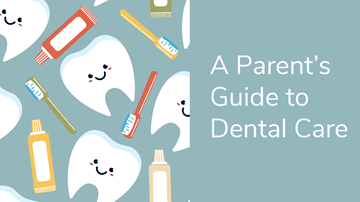Many parents are surprised to learn that dental care comes even before teeth erupt from the gums. Children who develop tooth decay early are more likely to have immediate and long-term oral health issues.
Your child’s dental health begins shortly after birth. The following recommendations from Jenkins Dentistry for Kids will help guide your family to help create life-long dental health habits for your child, and prevent long-term oral health issues.
Birth – 2 Years Old
Jenkins Dentistry for Kids recommends cleaning your baby’s mouth and gums with a soft cloth or infant toothbrush at bath time. This routine will also help prepare your baby for teeth cleanings to come.
Around the age of six months, when solids and water are introduced, avoid or limit sugary liquid and carbohydrates before bedtime. We recommend giving your baby only water in a bottle before and when going to sleep. Juice, milk, and formula put teeth under attack from bacterial acid all night long.
When your baby starts teething, give them a firm rubber teething ring to chew on and to help with the pain and discomfort. Avoid any liquid-filled teething toys, or anything with the potential to break or pop as your child is chewing. You can also place teething toys in the freezer to give your baby extra relief while chewing.
By your child’s first birthday or shortly after their first tooth arrives, you should schedule a visit with a pediatric dentist and establish a dental home. A pediatric dentist will help your family establish a daily regimen, provide recommendations, and determine your next visit. Your pediatric dentist can also recommend when to start using fluoride toothpaste and how much you be using based on their age.
2 – 5 Years Old
By this age, ideally, you’d have an established twice-a-day dental routine with your child. This includes brushing their teeth in the morning and at night, shortly before bed. After brushing at night, it’s important not to give your child any sugary foods or drinks – just water.
Sucking on a thumb, finger, and pacifier may affect your child’s development. Sucking for prolonged periods of time may cause the upper front teeth to tip outward or not come in properly. Most children will stop this habit on their own, but if not, try to help your child break this habit by the age of three. Ask your pediatric dentist for advice or creative ideas to help break the sucking habit.
Nutrition is extremely important to your child’s oral health and development. Crunchy fruits and vegetables can help clean your child’s teeth throughout the day and help keep them strong. Ideally, children should have no more than three snacks a day. Avoid sugary juices, which will literally bathe your child’s teeth in sugar. Try to limit the amount of juice you give your child to less than 6 oz. per day. You can also dilute the juice by adding water.
This is the age range where parents can introduce flossing to their child’s dental routine. Any two teeth that are touching can be flossed with regular dental floss or dental picks.
Your child should be seen by a pediatric dentist every six months to avoid plaque buildup and decay. Routine dental cleanings at regular check-ups help remove tartar and gingivitis.
School-Age Children
At this age, your child will transition into caring for their teeth independently. Parents should supervise the brushing of their children until they are seven or eight years old. Where teeth are touching, show your child how to floss and let them try to floss their own teeth.
Continue to encourage and prepare healthy snacks for your child. Avoid carbonated beverages, which can erode the enamel on teeth. Limit the amount of juice pouches, sodas, and sports drinks your child consumes; they contain sugar additives and keep the acid levels high in your child’s mouth, leading to plaque buildup.
Remember to protect your child’s teeth with a mouthguard when they participate in physical activities, including recreational sports.
Continue your regular visits to the pediatric dentist every six months. Your pediatric dentist and hygienists can provide you and your child with educational resources, tips for brushing and flossing, and help you and your family create life-long healthy dental habits.
Ready to schedule an appointment or have questions for Jenkins Dentistry for Kids? Call today!

